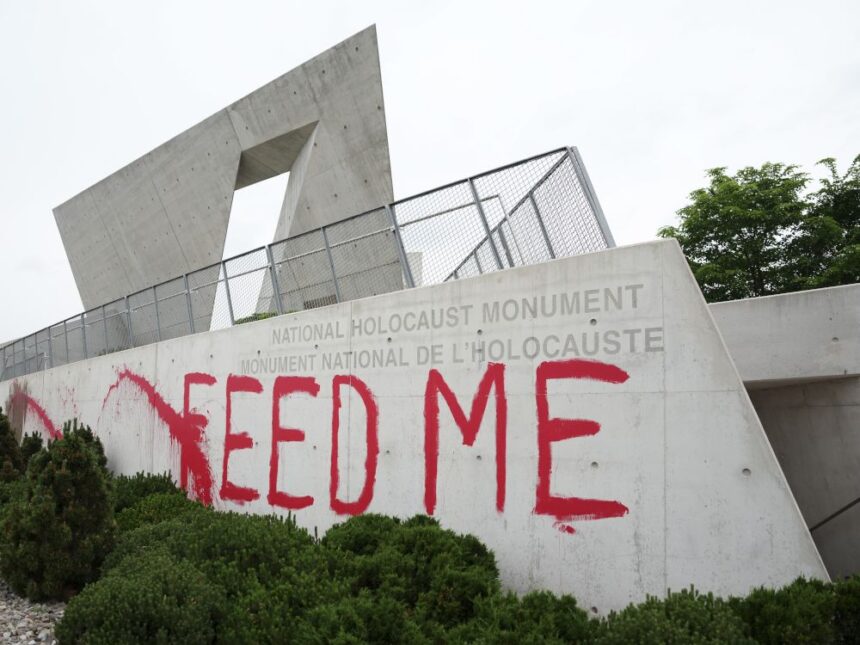Canada’s National Holocaust Monument was vandalized last week, sending ripples of concern through the Jewish community and beyond. The Ottawa Police Service has taken a former local lawyer into custody who has since admitted responsibility for what authorities are investigating as a potential hate crime.
The monument, unveiled in 2017 near the Canadian War Museum, features concrete triangular structures forming a Star of David when viewed from above. Visitors reported finding graffiti sprayed across several panels early Thursday morning, with messages that appeared to deny the historical reality of the Holocaust.
“I arrived with my family to pay respects and was confronted with this desecration,” said Rachel Goldstein, who discovered the vandalism while visiting from Toronto. “My grandfather survived Auschwitz. To see someone attack this memorial feels like an attack on his memory and on all Holocaust victims.”
Court documents show the suspect, identified as Martin Reeves, 42, previously practiced law in Ottawa before being disbarred in 2020 for professional misconduct unrelated to antisemitism. Reeves has no known affiliation with organized extremist groups, according to police spokesperson Constable Sarah Drummond.
“The accused surrendered himself voluntarily and has been cooperative with investigators,” Drummond told me during a phone interview. “We’re still examining potential motivations, but the targeting of this specific monument raises obvious concerns.”
The Centre for Israel and Jewish Affairs (CIJA) condemned the vandalism in the strongest terms. “This isn’t random graffiti—this is an attempt to erase one of history’s darkest chapters,” said CIJA president Shimon Fogel. “Especially troubling is the timing, coming amid a documented rise in antisemitic incidents across Canada.”
Statistics Canada reported a 47% increase in antisemitic hate crimes in 2022 compared to 2021, with incidents ranging from verbal harassment to property damage and physical assaults. The trend has continued upward through 2023, according to preliminary data from B’nai Brith Canada’s Annual Audit of Antisemitic Incidents.
Dr. Emily Langer, professor of Holocaust studies at McGill University, explained the broader significance of monument desecration. “Monuments serve as physical anchors for collective memory,” she said. “Attacking them is a way to attack the shared understanding of historical truth itself.”
I reviewed security footage from adjacent buildings that shows a lone individual approaching the monument around 2:30 a.m. Thursday, spending approximately 15 minutes at the site. The footage has been provided to investigators but hasn’t been released publicly to protect the integrity of the prosecution.
Crown prosecutors are consulting with federal Justice Department officials to determine whether to pursue charges under Canada’s hate speech laws in addition to criminal mischief. Section 319 of the Criminal Code prohibits public incitement of hatred against identifiable groups, carrying penalties of up to two years imprisonment.
“The bar for hate speech prosecutions in Canada is intentionally high to protect free expression,” explained constitutional lawyer Catherine McLellan. “However, courts have consistently upheld that Holocaust denial can constitute hate speech when it targets Jewish communities by attempting to deny their historical suffering.”
Heritage Minister Pascale St-Onge issued a statement promising that cleanup efforts would begin immediately. “This monument stands as a solemn reminder of where hatred can lead,” the statement read. “Its desecration only strengthens our resolve to combat antisemitism and all forms of hate.”
The incident has prompted calls for increased security at Holocaust memorials and Jewish cultural sites across Canada. The National Capital Commission, which oversees the monument, is reviewing security protocols but declined to share specific measures being considered.
Rabbi Daniel Friedman, who chaired the National Holocaust Monument Development Council, emphasized the memorial’s educational purpose. “This monument wasn’t built just to remember the six million Jews murdered during the Holocaust, but to teach future generations about the dangers of unchecked hatred,” he said. “Ironically, this vandalism demonstrates precisely why we need such memorials.”
Reeves has been released on conditions including staying away from Jewish institutions and the monument itself. His first court appearance is scheduled for next Tuesday at the Ottawa Courthouse.
Workers have already begun removing the graffiti using specialized cleaning methods designed to preserve the monument’s concrete surfaces. Community members have organized a vigil for this weekend, with hundreds expected to attend.
“We won’t let this act of hate stand unchallenged,” said Ottawa Mayor Mark Sutcliffe. “This monument belongs to all Canadians, and we will protect both the physical structure and what it represents.”






